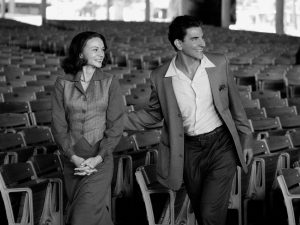
Here’s a toolkit for talking climate change over the holidays
Southern Californians have much to be thankful for this holiday season as residents of a place that often feels the effects of climate change firsthand. The drought is over, for now, a relatively mild wildfire season is wrapping up and temperatures have been more moderate than in recent years.
But globally, people witnessed the consequences of a warming planet in 2023 like never before.
Scientists say massive wildfires in Canada, deadly flooding in North Africa and record heat waves in Phoenix, to name a few of the year’s extreme weather events, were all supercharged by climate change. This year will almost certainly go down as the hottest on record. One climate group reported that the global average temperature on Friday, Nov. 17 briefly reached more than 2 degrees Celsius above pre-industrialization levels for the first time — well above the 1.5-degree goal set by the Paris Climate Agreement to help us avoid more catastrophic effects. And a United Nations report out this week says the planet currently is on pace for nearly 3 degrees of warming by the end of the century.
Such news may not sound like good fodder for conservation at holiday parties or around the family dinner table. That’s why many people still lump climate change in with politics and religion, as topics to be avoided in social settings.
But advocates say if we stop thinking of climate change as a partisan issue, or as something most people choose to believe in, and instead start thinking of it as a fact of life that we all need to cope with, discussing it doesn’t have to be any more controversial than, say, chatting about how we’re gearing up for winter or retirement. More importantly, experts say discussing climate issues with family and friends can help to normalize such talk, clear up misconceptions and make people more empowered to act.
That’s why Fred Smoller, a Chapman University professor who co-founded the Orange County Sustainability Decathlon, said he won’t shy away from raising this “timely and important” topic over the holidays by throwing out ice breakers like:
“Did you see the movie ‘Don’t Look Up?’… What do you think the movie was about?” (Spoiler alert: It was a metaphor for global warming.)
Even if you don’t mention global warming over turkey dinner, we all have at least one relative or friend we can count on to try and stir the pot — and not the one with gravy inside.
So here’s a toolkit of sorts to help you navigate climate conversations this holiday season.
Use your ears
One of the most important ingredients for effective conversation on any thorny topic is already baked into most holiday celebrations, according to Emma Frances Bloomfield, a communications professor at the University of Nevada, Las Vegas who wrote a book about climate skepticism.
Unlike battling strangers over the Internet, she said, “If you’re having a conversation with someone that you genuinely care about, and have a strong relationship with, I think those can be very powerful conversations.”
But Bloomfield said setting aside assumptions, and asking questions to learn more about why people believe what they believe and what they value, is key.
Connecting climate change to what people value is also a favorite strategy for Tori Goebel with the nonprofit group Young Evangelicals For Climate Action. That’s why, she said, “The first step is actually to stop and listen.”
When listening to skeptics express their feelings about the environment, Goebel said she’s heard people say they just have more immediate concerns, such as the health of their children. She then shares how the quality of our air and water are deeply connected to kids’ health.
“I think we can find a lot of common ground by doing that,” she said.
The common ground for family members of Brady Bradshaw, with the Center for Biological Diversity, is a love for the ocean. So he shares how “the oceans literally ‘take the heat’ for us,” absorbing some 90% of atmospheric warming. Bradshaw tells family members that making ocean ecosystems healthy again is a big part of mitigating climate change.
To drive the issue home for his Temecula family, Cooper Proulx, a UC Riverside student who just finished a sustainable home project, points to how air quality issues in the Inland Empire are causing a spike in the rate of childhood asthma.
Steven King, a clean air advocate for Environment California, also likes to share how global warming has affected his life.
“My family had to evacuate from our home in Agoura Hills because of a wildfire that reached our neighborhood,” he said. And with warmer, drier conditions fueling such fires, he notes, “these situations are only becoming more common.”
Responding to common claims
Climate skeptics tend to repeat many of the same arguments when they reject the science that says human activity is causing our planet is warm at an unprecedented rate. Here’s how to respond to a few common claims.
Claim: The planet has always had phases of warming and cooling.
Response: That’s true. Earth’s warming and cooling cycles that have unfolded over millions of years have long been caused by natural factors, such as our planet’s wobbly orbit around the sun and heavy volcanic activity that releases carbon dioxide.
But since humans started burning fossil fuels to power our factories and cars, NASA says global average temperatures have spiked 10 times faster than they did when the Earth was coming out of previous glacial periods. That means it took just 100 years for temperatures to rise 1 degree Celsius above pre-industrial levels, or as much as they did over more than 1,000 years during previous, natural warming cycles.
Scientists also know, after studying gases trapped in glacial air bubbles and chemicals in ancient fossils, that carbon dioxide levels in the atmosphere haven’t been this high since for at least 15 million years. Carbon from burning fossil fuels leaves a distinct chemical signature, so scientists can distinguish man-made changes from natural sources. And there’s simply no scientific way the Earth wouldn’t get warmer when there are more heat-trapping gases in its atmosphere.
Claim: So maybe we’re speeding the cycle up a bit. That doesn’t mean we should change our lives or spend billions trying to slow it down.
Response: Civilization as we know it didn’t exist the last time the planet gradually and naturally got this hot, more than 120,000 years ago. But scientists believe past temperature swings caused some species of ancient humans to die out, while triggering evolutionary changes in others and forcing them to migrate to survive.
If this warming continues to happen 10 times faster than it did in the past, will humans and other living creatures have time to evolve?
We’re already seeing climate refugees, forced to flee the Middle East, North Africa and other places as flooding, droughts and other side effects of climate change make their livelihoods untenable and towns unlivable. Those people have to go somewhere, which is why many political leaders see the warming planet as a national security issue.
Meanwhile, warming already is making disasters such as wildfires more frequent and devastating. The cost in terms of human life, public health and property damage that such disasters generate is difficult to quantify. But the solution is clear: stop burning fossil fuels. And if we don’t spend money now to make that change, those other costs are only going to escalate for the next generations.
Claim: The science on all of this just isn’t settled.
Response: You can seek out scientists who are outliers on any topic. And sure, scientists are still investigating fine points of climate issues. But more than 99% of climate scientists now agree that human activity is driving global warming.
They got there after considering a wide range of research over decades. That includes averaging temperature readings from thousands of weather stations, with that warming trend confirmed by observed changes such as birds migrating sooner, ice sheets melting and ocean acidification increasing. And scientists can see from testing tree rings, ice cores, fossils and lake sediment how modern conditions differ from past cycles.
What to do if the talk gets heated
“The moment you resort to getting upset, any productivity in the conversation has ended.”
That’s the first tip California Environmental Voters offers for navigating climate talk during the holidays. The group recommends staying calm and not taking things personally. But if the other person clearly isn’t interested in a serious discussion, it’s time to let that one go.
If the discussion gets too heated, Smoller said he pivots to the promise of the “sustainability sector,” such as electric cars and solar panels.
Focusing on all of the positive outcomes that can come with such solutions is a favorite move for King. He shares, for example, how climate solutions “also make our air and water cleaner and healthier, save money and strengthen our energy independence.”
How can anyone argue against that?
Related Articles
Healey admin awards $27 million toward greening of affordable housing projects


